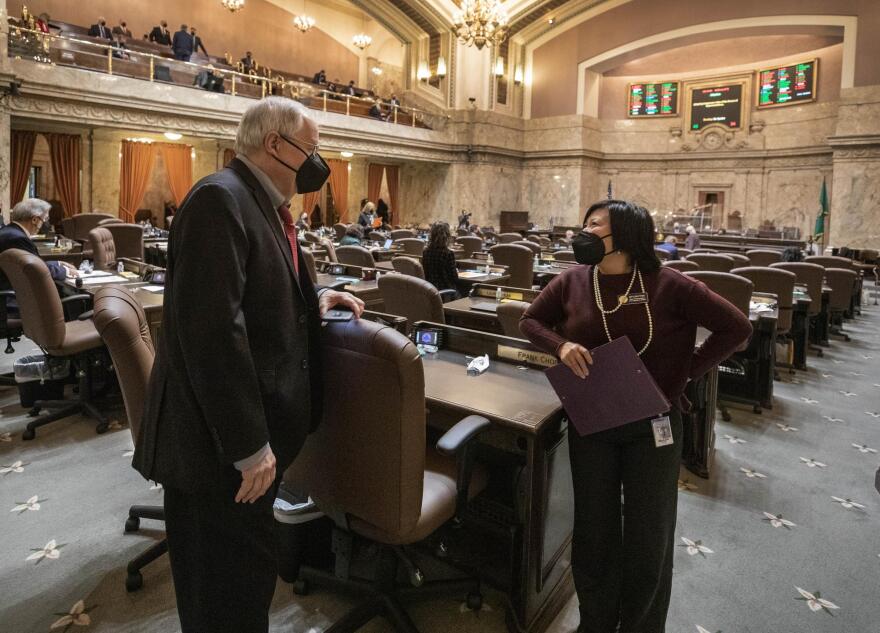For state Rep. My-Linh Thai, the recent images and sounds from Afghanistan have hit close to home.
“I turned on the news and I turned off the news, and I turned the news back on and I turned it back off,” she said. “It was hard, very hard.”
Thai, D-Bellevue, is a refugee. She was a child during the Vietnam War, living in a small community on the Mekong River Delta. After the war, her father was taken to a labor camp. He got out eventually and, in 1983, she and her family fled Vietnam and came to the United States.
The images of the fall of Saigon are iconic and searing. And recent days have been full of similar scenes. Thousands of people surrounding the airport to escape. The crowds running onto the runway. And of course, the now-viral footage of hundreds of people surrounding a C-17 jet as it rolls forward, clinging to the massive plane in hopes of getting on board and away from Kabul. Thirteen people died in that incident.
Thai has worked to keep herself focused.
“I take walks often, and I saw a little grass that pokes out from a crack of concrete attempting to find life in that very small space. That was the image that I put into my brain,” she said. “It helped me sit down and take actions as a leader, as somebody who has that experience. It’s extremely difficult to not lay on my bed, cover myself with my blanket and cry my eyes out.”
Leaving home to find home
She says her family, like many others, did not seek to leave Vietnam in April 1975, when the U.S. pulled out. But eventually they did. She was 15 years old.
“I was an angry teenager,” she said. “That part of my life, I shut it out for a long time. I didn’t want to revisit it.”
But she reflects on it more often now. It was an adventure, but she was also mad at her parents for taking her away from familiarity – friends, teachers, her community.
Plus, she felt like she could reshape the future for Vietnam. By leaving, she felt like that was no longer possible.
“For those first two years, I was pretty much a mute,” she said. “I couldn’t understand what people were telling me, and I couldn’t articulate what I wanted to communicate back.”
Washington is home now. But so is Vietnam, still.
“I knew every storm, I knew every flood,” she said. “Now I see the interconnections. I move more toward the concept of ‘Whatever happens in the United States impacts what happens in Vietnam,’ ” and vice versa, she said. “If my love is deep for both countries, it is important for me to care for a country like Cambodia, Laos or Afghanistan – what happened there.”
Welcoming Afghans
It’s ultimately up to the federal government to decide who gets refugee status in the United States. But elected leaders in our state – from across the political spectrum – were quick to say they’d welcome Afghan refugees.
Thai says it’s important that they get a clear message when they arrive.
“You are not a stranger. You are family,” she said. “You are part of the community and we love you and we care for you, and you are part of us, and let us know how we can welcome you better than the experience I had.”
In her experience, individuals were generous and eager to help, but systems were difficult to access. The system is superficial and skin deep, she said – able to process people but not terribly concerned with how they feel as they move through that process.
Afghans who come here, she says, will face culture shock. Little things.
“Everything is very different here,” she said. “I still remember turning on the faucet, and when the hot water came out, I thought that was magical.”
She worries about the current of overt nationalism present in the country right now. And she hopes Afghans who live here now can play an active role in welcoming refugees, or maybe even lead the effort.
Thai says she’s most worried about Afghan children who are resettled.
“I would want them to feel this is their home,” she said. “I hear many of the leaders in Washington state, on both sides of the aisle, talking about that moral obligation. I believe it’s more than that. I believe it’s beyond moral obligations.”
She says this is an opportunity for us to live the American values we all talk about.
“And I say ‘live.’ I didn’t say ‘show,’ ” she said, “because ‘show’ is not deep enough. We have to live it.”


